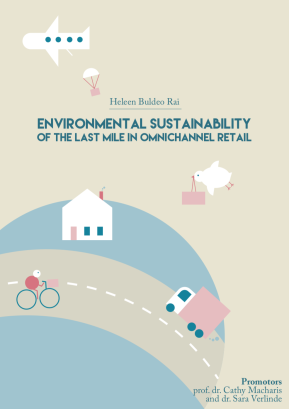
The retail sector has changed radically in the last years, driven by possibilities created by the internet. Consumers adapted their behaviour accordingly, purchasing online as well as in-store and combining several retail channels for a single purchase. This type of behaviour is called “omnichannel” and spurred the development of retail models accommodating this behaviour, by integrating online channels (e.g. web shop, mobile shop) with offline channels (e.g. physical stores). Omnichannel retail enables highly personal purchase journeys, which call for diverse, tailored and dynamic transport options to deliver purchases to consumers and drive logistics complexity. How this so-called “last mile” to consumers materialises in omnichannel retail is unclear. As transport is a major contributor to climate change and air polluting emissions that negatively affect our global and local environment, the environmental impact of omnichannel retail is unclear as well. This knowledge is needed to drive sustainable decision-making by the stakeholders involved (i.e. consumers, retailers and logistics service providers) and is key in determining which retail model is most sustainable. Therefore, the objective of this PhD is to understand the impact of omnichannel retail on the last mile, and on the last mile’s environmental sustainability. To this end, a threefold approach is adopted. First, the last mile options in omnichannel retail are identified by means of literature reviews and expert-interviews. Second, consumer preferences for these options are assessed by means of surveys. Third, the impact of these options is determined by means of case-study based external transport cost calculations. Findings show that omnichannel retailers outsource the last mile to logistics service providers,
although insourcing (for e-grocery) and crowdsourcing (for ship-from-store)
strategies are qualified for specific situations. To most consumers, free, next-day
delivery to an address of choice is the preferred last mile option, yet they are
making trade-offs: when delivery and return are free, consumers are willing to wait longer for their orders to arrive or collect their orders themselves. Collection points are most beneficial from an environmental perspective, but only when consumers walk, bike or are en route of a multi-purpose trip. To this end, local crowdsourced neighbourhood relays are of interest. Deliveries at home have the second to lowest environmental impact. However, this largely depends on whether consumers travel for pre-purchase activities (i.e. product research and testing), which online shoppers are significanty more inclined to than store-shoppers. It also depends on the party executing the deliveries. In this respect, crowdsourced deliveries are unfavourable. As the crowd makes dedicated trips, the environmental impact of deliveries multiplies as compared to deliveries by logistics service providers.
